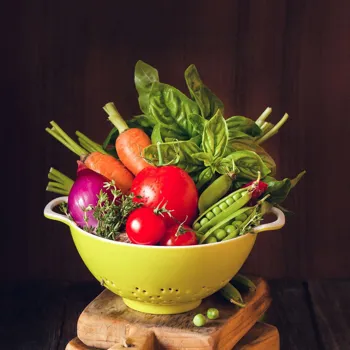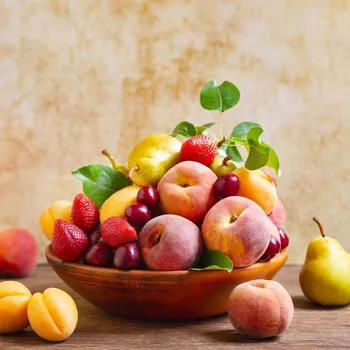Discover the significance of cooking with seasonal ingredients for eco-conscious chefs. Explore why it truly matters
In our bustling cities and ever-evolving culinary landscape, it's easy to lose touch
with the natural rhythms of the earth. We often find the same vegetables and fruits available year-round, neatly stacked in supermarket aisles, tempting us with their glossy appearance.

But have you ever stopped to wonder about the journey these ingredients have undertaken to reach your plate? The environmental cost, the diminished flavour, and the missed opportunity to savour nature's bounty at its peak?
For the eco-conscious chef, and for anyone who cares about the planet and their health, cooking with seasonal ingredients is not a passing trend, it's a foundational principle.
It's about reconnecting with the land, celebrating the harvest, and creating dishes that are not only delicious but also sustainable. It's a conscious choice that benefits the environment, supports local farmers, and nourishes our bodies with the best that nature has to offer at any given time.
So, let's dive into the world of seasonal cooking and explore why it truly matters.
Choosing seasonal produce supports local farmers and economy, aligns with natural growth cycles
Choosing in-season produce is like tuning into the earth's natural calendar. Imagine biting into a juicy mango during the sweltering summer months, its sweetness intensified by the sun's embrace.

Or enjoying the earthy warmth of root vegetables in winter, providing much-needed nourishment during the colder days. These experiences are not just about taste; it's about aligning our diets with the natural cycles of growth and harvest.
Seasonal produce is naturally at its peak flavour and nutritional value because it has ripened under ideal conditions. There's no need for artificial ripening or long-distance transportation, which can significantly impact the taste and nutrient content.
When you buy local seasonal produce, you're supporting your local farmers and economy. This in turn helps create a more resilient and sustainable food system and ensures fresh and safe products. Moreover, seasonal and local goes hand-in-hand.
Seasonal cooking benefits environment by reducing carbon footprint and supporting sustainable food system
One of the most compelling reasons to embrace seasonal cooking is its positive impact on the environment. Out-of-season produce often travels long distances, contributing to greenhouse gas emissions through transportation.

It may also require energy-intensive storage and preservation methods, further increasing its carbon footprint. By choosing seasonal and local produce, we can significantly reduce our environmental impact and support a more sustainable food system.
Seasonal items mostly require less pesticides and fertilizers. Since it is naturally available, the demand is less, there is less transport involved and the overall environmental impact is much less. The use of more pesticides and fertilizers can disrupt the soil and also affect the crops.
Seasonal crop produce involves organic farming methods and techniques. Thus, it helps maintain soil quality and texture.
Cooking seasonally leads to culinary creativity and cultural exploration
Cooking with seasonal ingredients can be an incredibly rewarding culinary adventure. It encourages creativity and allows you to explore new flavours and textures. When you're limited to what's in season, you're forced to think outside the box and experiment with different recipes and techniques.
This can lead to exciting new dishes and a deeper appreciation for the diversity of ingredients around you. You might discover new vegetables or fruits that you've never tried before, sparking your culinary curiosity and expanding your palate.
Moreover, embracing the seasonality means you can enjoy regional and traditional cuisines. Learning about heritage recipes handed down through generations can enrich your understanding of the local food culture.
It also helps to preserve the culinary traditions and gives you an opportunity to know more about different food groups.
Embrace seasonal cooking for a sustainable lifestyle
But how do you actually put this into practice? The first step is to educate yourself about what's in season in your region. Local farmers' markets are a great resource for this, as are websites and apps that provide seasonal produce calendars.
Talk to local farmers, ask what they're growing, and get inspired by their passion for fresh, local food. Plan your meals around seasonal ingredients, and be flexible with your recipes. If a particular vegetable is not available, be open to substitutions.
Don't be afraid to experiment and try new things. When you're buying from the supermarket, look for locally grown produce that is clearly labelled with its origin. Make conscious choices that support local farmers and encourage sustainable practices.
Remember seasonal cooking is not simply about following a trend. This is about having a lifestyle that benefits our environment.
Cook with seasonal ingredients for a sustainable and flavorful experience
Ultimately, cooking with seasonal ingredients is a conscious choice that requires a little more effort and planning. But the rewards are well worth it.
You'll enjoy fresher, more flavourful food, reduce your environmental impact, support local farmers, and connect with the natural rhythms of the earth. It's a way to nourish your body and soul while contributing to a more sustainable food system.
So, embrace the seasonality of food, explore the culinary possibilities, and become an eco-conscious chef in your own kitchen. Each meal becomes a celebration of the seasons, a testament to the power of nature, and a step towards a healthier planet.
A simple and delicious act, where every bite tells a story of sustainability. And this way, one can create a huge impact that is good for the earth.



















